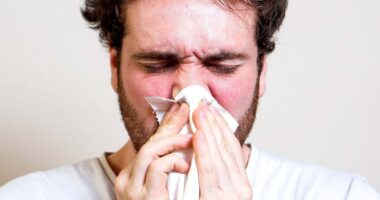Experts say our physical aptitude can be a “crucial” indicator of our overall health. More specifically, a simple 20-second test could determine how fit and healthy we are.
Keeping fit and active is known to improve our chances of living longer. Not only does it give our joints and muscles a workout, but it helps strengthen vital organs like the heart and lungs.
Known as the sitting-rising test (or SRT), this quick exercise can reveal how strong and balanced we are, and whether we are at risk of falls – and dying early.
Health experts from UsayCompare explained: “The significance of mastering the sitting-rising movement lies in its correlation with your overall physical condition.
“This seemingly simple action engages multiple muscle groups and requires coordination, balance, and strength. It’s also been proven to promote longevity and vitality.
“Addressing challenges with this basic movement not only improves everyday functionality but also serves as an important indicator of one’s overall physical health and well-being.”
To perform the SRT you begin in a standing position. Without using your hands or any external support, lower yourself to a seated position on the floor.
Then, rise back to a standing position from the seated position.
To calculate your results each component of the movement, including the descent to a seated position and the rise back to standing, is scored out of five points, with a maximum total score of 10 points.
Points are deducted for the use of hands, arms, knees, or other forms of support during the movement.
“Higher scores indicate better functional movement and overall physical condition,” experts at UsayCompare said.
“Individuals who are able to complete the test without difficulty and with minimal assistance typically have better functional movement and may be at lower risk for falls and other adverse health outcomes.”
They added: “Conversely, individuals who struggle with the sitting-rising test or require significant assistance to complete it may have underlying health issues that need to be addressed.
“Difficulties with the test have been associated with increased risk of falls, functional decline, and mortality, so it is important to identify and address any potential health issues early on, which could include seeking professional medical evaluation, if necessary.”
One scientific study, published in the European Journal of Preventive Cardiology in 2014, found that people who scored lowly on the SRT were more likely to die younger.
As part of the research, 2,002 adults aged between 51 and 80 years performed the SRT and were scored on their performance.
They were followed up six years later during which time 159 participants had died.
According to the team, “a continuous trend for longer survival was reflected” the higher the SRT score was.
The study concluded: “Musculoskeletal fitness, as assessed by SRT, was a significant predictor of mortality in 51 to 80-year-old subjects.
“Application of a simple and safe assessment tool such as SRT, which is influenced by muscular strength and flexibility, in general health examinations could add relevant information regarding functional capabilities and outcomes in non-hospitalized adults.”








